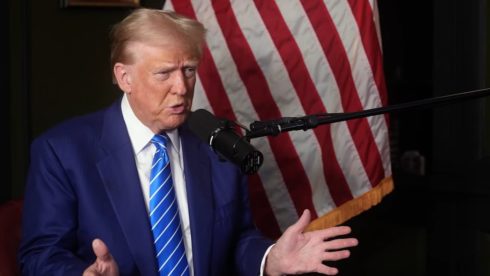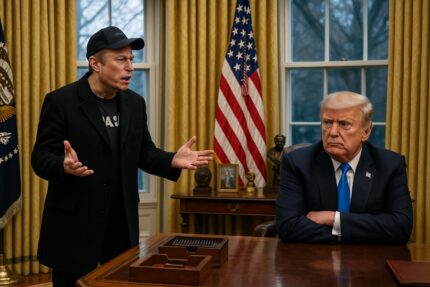Former President Donald Trump, known for his outspoken and often controversial use of social media, recently admitted that he sometimes regrets what he shares on his Truth Social platform. This admission comes in the wake of intense criticism over a vile post he re-shared about Vice President Kamala Harris. During an appearance on the Lex Fridman podcast, Trump was directly asked whether he regrets some of his posts and if he is “being intentionally provocative” online.
In response, Trump acknowledged that while he does have regrets, they are not frequent. He explained that the posts which get him into trouble are often those he re-shares from others, as he may not fully understand the implications or the affiliations of the groups behind the content.
Trump further elaborated on the challenges of managing his social media presence, noting that reposts are particularly tricky. He admitted, “You don’t even know if those groups are good, bad, or indifferent. But the reposts are the ones that really get you in trouble.” Despite these challenges, Trump defended his use of social media, emphasizing that his platform has been “very, very powerful” and likening it to his personal “typewriter.” This acknowledgment of regret is a rare moment of reflection from Trump, who has built much of his political brand on his unfiltered and provocative online presence.
Backlash Over Vile Kamala Harris Post
The controversy surrounding Trump’s recent social media activity reached a boiling point when he re-shared a derogatory post about Vice President Kamala Harris. The post, which originated from an X (formerly Twitter) user, featured a photo of Harris standing next to former Secretary of State Hillary Clinton, accompanied by the caption, “Funny how blowjobs impacted both their careers differently.” The crude comment was a clear reference to Harris’s past relationship with Willie Brown, a former mayor of San Francisco, which right-wing commentators have long used to smear her career advancements.
The backlash to Trump’s decision to share such a post was swift and widespread, with critics condemning it as misogynistic and demeaning. The incident has reignited debates over the toxic nature of political discourse in the United States, particularly on social media platforms. It also highlights the ongoing scrutiny that female politicians, especially women of color like Harris, face in the public sphere. Despite the criticism, Donald has remained defiant, insisting that his platform and the truths he shares are powerful tools in his political arsenal.
Harris Pushes Back Against Trump’s Online Attacks
Vice President Kamala Harris has strongly defended herself against a series of recent online attacks from former President Donald Trump. These attacks, which have drawn widespread attention and criticism, have been characterized by many as sexist, racist, and deeply offensive. Trump’s reposts on his social media platform, Truth Social, have included memes and images targeting Harris, as well as other prominent Democrats, in what many see as an attempt to undermine her growing influence and momentum in the political landscape.
Harris has responded to these attacks by emphasizing her qualifications and experience. She argues that her career accomplishments speak for themselves, and that the attacks are a reflection of Trump’s fear of her rising popularity. “These baseless and offensive attacks are just another example of Trump trying to distract from his own failures,” Harris said in a statement. “I will not be deterred by these attempts to silence me or to diminish my achievements.”
Liberal Backlash and Accusations of Fear-Mongering
The online attacks have sparked significant backlash from liberal commentators and activists, who have accused Trump of using fear-mongering tactics to rally his base. As images of Trump’s reposts spread on social media, many liberals expressed outrage at the former president’s behavior. “This should be a headline on every major news outlet,” wrote Cyndi Borowski on X, formerly known as Twitter. “The American people deserve to see this.”
Critics argue that Trump’s attacks on Harris are part of a broader strategy to undermine her credibility and stoke fear among his supporters. “This is the Donald Trump playbook, in particular, when he’s on the defensive and feels he is not driving the conversation,” said Jessica Mackler, president of EMILY’s List, a progressive organization that supports female candidates who back abortion rights. “He uses these really gross, really sexist, often racist, and sexual-in-nature attacks. It panders to his base and seeks to create chaos around him.”
Mackler and others believe that Trump’s attacks are a sign of his concern over Harris’s growing influence and the enthusiasm surrounding her potential candidacy. “The more we see this movement by the Harris campaign, the more we see this enthusiasm, the more he is pushed to those all-time lows,” Mackler added.
Trump Campaign Defends Controversial Reposts
Despite the widespread criticism, Trump’s campaign has defended the former president’s actions, arguing that his reposts are simply a reflection of his unfiltered and candid style. In a recent interview with CNN, Vice Presidential candidate JD Vance described Trump as “a political candidate who isn’t stodgy, who likes to have some fun and likes to tell some jokes.” Vance suggested that Trump’s willingness to engage in this type of humor is a strength, rather than a weakness. “I’d much rather have a candidate who’s willing to give every interview and is willing to tell some jokes,” Vance said. “I do think that’s how you lift people up.”
Trump’s campaign spokeswoman, Karoline Leavitt, also pushed back against media criticism, particularly from the New York Times, which had highlighted Trump’s repost of a meme targeting Harris and former President Bill Clinton. Leavitt asserted that Trump was simply raising legitimate questions about Harris’s ability to serve as commander in chief. On X, Donald’s supporters echoed this sentiment, with one user responding to a Washington Post reporter’s criticism by writing, “Your problem is? Seems accurate, no lies told.”
The Trump campaign’s defense highlights the deep divide in how different segments of the American public perceive his actions. While his supporters see the reposts as a justified critique of Harris and other Democratic leaders, his detractors view them as yet another example of the former president’s divisive and inflammatory rhetoric. As the 2024 election approaches, it remains to be seen how these dynamics will play out on the national stage.
Implications for Trump’s 2024 Campaign
As Trump continues his bid for the 2024 Republican nomination, his social media behavior is likely to remain a focal point of both his campaign strategy and the controversies that surround it. While his unfiltered style has endeared him to a significant portion of the Republican base, it also poses risks, especially in a general election where moderate voters may be turned off by such inflammatory rhetoric. Donald’s admission of occasional regret may be an attempt to temper some of the criticism, but it is unclear whether this will translate into a more measured approach moving forward.
The recent controversy involving Vice President Harris is particularly significant as it underscores the challenges Donald faces in appealing to a broader electorate. The use of sexist and demeaning language could alienate female voters, a demographic that has been critical for both parties in recent elections. Furthermore, the incident may provide ammunition for his political opponents, who can use it to portray Donald as out of touch with the evolving standards of political discourse. As the 2024 campaign heats up, Donald’s handling of these issues will likely play a crucial role in determining his electoral prospects.














